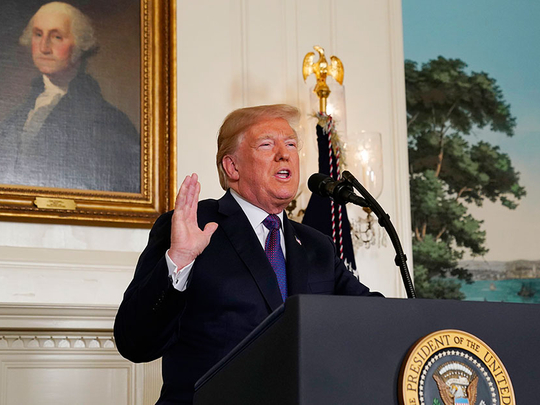
Beirut: For the second time in just over a year, President Donald Trump, in sending missiles crashing into Syrian military targets, added US firepower to one of the most complex and multi-sided conflicts in a generation.
One immediate question was whether the strikes could actually accomplish the stated goal of diminishing Syria’s capacity to make and use chemical weapons. But the new strikes also posed the risk of drawing the United States even more deeply into a conflict in which Russia and Iran — who warned Trump not to intervene — have more invested than ever in keeping Bashar Al Assad in power.
The strikes hit Syria before dawn on Saturday. US officials said the offensive was to punish Syria for what they called a chemical weapons strike on civilians in Douma. They said that the strikes targeted Syria’s ability to research, develop and produce chemical weapons, and that they hit military facilities in and near Damascus and near the central city of Homs.
US officials said they were still assessing the results, but as the dust settled, some observers were underwhelmed.
“If this is it, Al Assad should be relieved,” tweeted Randa Slim, an analyst at the Middle East Institute.
Sure enough, early Saturday morning, Al Assad’s office posted a video that appeared to show him strolling into work in a suit and tie and carrying a briefcase as if nothing had happened.
Condemnation of the strikes from Syria’s allies was swift. Russia called for an emergency meeting of the United Nations Security Council. Ayatollah Ali Khamenei, the supreme leader of Iran, called the strikes “a crime” and the leaders of the United States, France and Britain “criminals.”
“But they will not benefit from this attack, just as they committed similar crimes over the past years during their presence in Iraq, Syria and Afghanistan and did not benefit from them,” he said.
There were no signs of immediate retaliation, suggesting that Al Assad and his allies planned to weather the storm, perhaps in the belief that the United States was mostly concerned with avoiding deeper involvement.
“If I were Al Assad, I would be thinking, ‘Let them get it out of their system. Things are still trending in the right direction today,’” said Faysal Itani, a senior fellow at the Atlantic Council. “Nothing that Trump said on television really touched on the Syrian conflict.”
In announcing the strikes on Friday night, Trump suggested that more US action could be on the way. “We are prepared to sustain this response until the Syrian regime stops its use of prohibited chemical agents,” Trump said. Other officials, however, said the United States and its allies were done for now.
Saturday’s strikes were more extensive than those Trump launched in the wake of another reported chemical attack last year, but much has changed in Syria in the meantime to make Assad and his allies more secure.
The rebels who once threatened his control have been routed from all of Syria’s major cities, and even from smaller strongholds like Douma, the last town they held near Damascus, which they surrendered after a reported chemical attack killed dozens of people last weekend.
Meanwhile, the war has further shattered Syria, and international powers including the United States, Russia, Turkey, Israel and Iran — along with militant groups including Hezbollah — have intervened to fight for their interests.
Iran and Russia have expanded their military reach. Russia has a presence on most Syrian military bases, and its air force has been essential to Al Assad’s recent advances. Iran has used the chaos of war to strengthen its proxies to deter and possibly confront Israel.
The United States still has about 2,000 troops in eastern Syria working with a Kurdish-led militia to fight Daesh. But with the militants now nearly defeated, US officials have started thinking about when to withdraw. Before the suspected chemical weapons attack in Douma, Trump had said he wanted to bring them home soon.
While the United States called for Al Assad to leave power early in the conflict and gave cash and arms to the rebels who sought to overthrow him, it has more recently resigned itself to his remaining in power. That was partly because it feared the vacuum that could emerge if Al Assad’s government collapsed, and partly because it was clear that Russia and Iran were willing to invest more in winning than the United States was.
So Saturday’s strikes remained focused on punishing him for using chemical weapons. Last year’s strikes had the same goal, but only succeeded for a limited time.
“Military interventions have a shelf life,” said Andrew J. Tabler, a fellow at the Washington Institute for Near East Policy who studies Syria. “For a certain time, it prevented them from using chemical weapons, but after a while it dissipated. So we’ll have to wait to see how this attack is different.”












